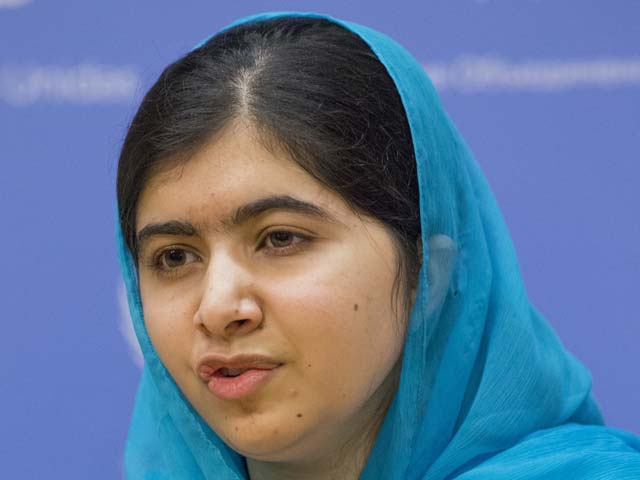
The 18-year-old Pakistani, who was shot by the Taliban for defiantly going to school, said she was so upset by abuses of girls at the hands of extremists in Syria and Iraq that she has stopped watching the news.
Read: #AylanKurdi: The three-year-old who broke the world's heart
But she saw and remained haunted by the picture of Aylan Kurdi, the Syrian toddler whose body washed up on a Turkish beach in an image that became emblematic of the risky exodus of refugees seeking safety in Europe.
"We lost humanity on that day when... nowhere a child is welcomed," she told reporters at the United Nations.
"It is important that people open their hearts and people open their lands to people who are now needing more support and who need the right to live," she said.
 Nobel peace laureate Malala Yousafzai (C) holds a news conference with her friends and fellow activists Kainat Riaz (L), Shazia Ramzan (2nd L), both from Pakistan, Amina Yusuf (2nd R) from Nigeria, and Salam Masri (R) from Syria, after speaking at the United Nations General Assembly at UN headquarters in New York, September 25, 2015. PHOTO: REUTERS
Nobel peace laureate Malala Yousafzai (C) holds a news conference with her friends and fellow activists Kainat Riaz (L), Shazia Ramzan (2nd L), both from Pakistan, Amina Yusuf (2nd R) from Nigeria, and Salam Masri (R) from Syria, after speaking at the United Nations General Assembly at UN headquarters in New York, September 25, 2015. PHOTO: REUTERSMalala appealed to world leaders to imagine their own children suffering the abuses meted out by the Islamic State movement, which has sexually enslaved girls from minority groups.
"The first thing is that the world leaders need to take all these issues more seriously," said Malala, who brought with her four girls including a Syrian refugee.
"They should think about their own children."
Malala came to New York for the adoption of a new UN development agenda, which aims to end extreme poverty in 15 years.
She met on the sidelines with German Chancellor Angela Merkel, who has emerged as the leading European force in support of welcoming refugees.
Read: Drowned Syrian toddlers and their mother buried in Kobani
The youngest-ever Nobel Peace Prize winner explained her fund that supports girls' education during the 15-minute meeting with Merkel, a German government source said.
Malala has not returned to Pakistan for three years amid concerns for her safety, instead studying in Birmingham, England.
She said she took two days off to come to the United Nations.
"I never miss a school day unless it's for a good cause and it really brings change," she said.
Malala urges world leaders to zero in on promoting education
As the World leaders on Friday pledged to end extreme poverty within 15 years, adopting an ambitious set of UN goals to be backed up by trillions of dollars in development spending, Malala urged world leaders to zero in on promoting education.
Stressing the need of unity for achieving the goal of education, Malala described the promoting education as "the real investment the world needs and what world leaders must do."
The new UN agenda aims to end poverty, ensure healthy lives, promote education and combat climate change, at a cost of between $3.5 and $5 trillion per year until 2030.
UN Secretary-General Ban Ki-moon described the plan as a "to-do list for people and planet" that laid out a "universal, integrated and transformative vision for a better world."
"The true test of commitment to agenda 2030 will be implementation," Ban told leaders. "We need action from everyone, everywhere."
The goals are non-binding, but the United Nations is planning to roll out 300 indicators to track progress and pile pressure on governments that fail to make the grade.
It is unlikely that all countries will achieve all of the goals, but aid groups say they will provide benchmarks for governments in every area of development.

1725784957-0/Tribune-Pic-(17)1725784957-0-165x106.webp)
1724760612-0/Untitled-design-(12)1724760612-0-165x106.webp)














COMMENTS (8)
Comments are moderated and generally will be posted if they are on-topic and not abusive.
For more information, please see our Comments FAQ